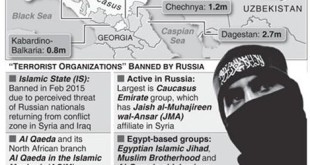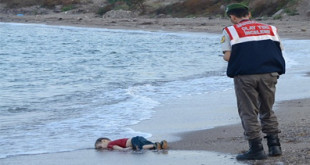“One day peace will come to Syria and when it does the Graffiti Boys should be remembered and their names should go up on another wall in Dar’a – a wall where their names can be carved with pride.”
“Ashaab yureed isqat annidham.” This phrase is ringing in the ears of tyrants and despots around the Arab world and means quite simply that the people want to bring down the regime. It is the enduring chant of the Arab Spring, so it’s hardly surprising that these are probably the first words children learn in their cradles as they are rocked to sleep to the beat of this rousing street anthem.
When a group of 11-year-old Syrian boys made their way home from school one day and started larking around, as boys of that age do, it was almost inevitable that among the graffiti they scratched on a partially-collapsed wall would be these iconic words. By revolutionary standards it was an unremarkable act, hardly worthy of mention because the same graffiti can be found on walls in most Arab countries. However, just as hard-up Tunisian fruit seller Mohammed Bouazizi is credited with igniting the Arab Spring with his self-immolation, this long forgotten, single act of childish vandalism lit the touch paper of the Syrian Revolution.
 It was a seminal moment in time that the Arab world’s Leftists would rather you forget; in their frenzied bid to rewrite the history of the Arab Spring they want you to believe that crazed Islamists are hijacking the peoples’ revolution. The Left in Syria, you see, isn’t as cuddly as the splintered socialist groups in Britain. These are hard-line fundamentalist, religion-hating secularists who have no room, not even a square inch, for religion in their world; not for themselves and not for anyone else.
It was a seminal moment in time that the Arab world’s Leftists would rather you forget; in their frenzied bid to rewrite the history of the Arab Spring they want you to believe that crazed Islamists are hijacking the peoples’ revolution. The Left in Syria, you see, isn’t as cuddly as the splintered socialist groups in Britain. These are hard-line fundamentalist, religion-hating secularists who have no room, not even a square inch, for religion in their world; not for themselves and not for anyone else.
While the people in Tunisia and Egypt fought for freedom from tyranny they also wanted the freedom to re-engage with their faith. Hence, to the shock and horror of the Arab Left, the people voted for trusted groups like the Muslim Brotherhood. It was something that the Left had never considered; they dismissed the Muslim vote as a figment of the imagination; never once did they ever imagine that Muslim groups would form political parties or even want to engage in democracy. And in Libya, although some of the more fundamentalist Islamic groups failed to secure the popular vote, other Islamic flavoured parties were swept in to power.
So Syria, you see, is probably the Arab Left’s last chance at having a revolution free from religion. This is most likely the reason for their opposition to the revolution from the very outset because they knew for sure that it would carry a strong religious flavour. Well, sorry to disappoint them. I crossed the length and breadth of Syria shortly before the revolution and saw most communities, Christian and Muslim alike, holding tight to their faith. Whatever shape their revolution will take, the future will be dominated by believers.
But let me return to the 18 boys at the beginning of this story because it is vitally important that we all remember exactly how the revolution in Syria began. It did not begin with CIA interference, nor an influx of foreign fighters, Al-Qaida, rebranded weapons from the West, NATO or a global call across the Muslim world for jihad.This was a reluctant revolution, a revolution forced on the people by the acts of an evil, malevolent regime.
In fact, though, while the 18 boys may have loaded the revolutionary gun way back in February 2011, the trigger was pulled by a man called Atif Najeeb, a cousin of Syrian President Bashar Al-Assad. Within two hours of the schoolboy prank, Atif instigated raids on every single one of the boys’ homes: armed police, the military and the ubiquitous security officials stormed every home at precisely the same time, demanding that the children be handed over. Amid the drama there was hand-wringing, cries from mothers, pleas from fathers to take the place of their sons and general confusion and chaos.
Distraught as news swept Dar’a, in the south-west of Syria less than six miles from the Jordanian border, the parents and their relatives gathered outside his office, but Atif Najeeb along with Faisal Kalthoum the governor of Dar’a, refused to meet any one of them.
For four days the families waited but not a single scrap of news came out about the fate of their sons. Eventually, a delegation made up of family members, local imams, the local headteacher and other dignitaries assembled and once again demanded to see Najeeb or the governor. After three hours they were herded into a room to meet the governor who remained seated while deliberately keeping the delegation on their feet. Culturally, this is a huge insult in the Arab world. At this point no one had even an inkling of what the boys had done to deserve their fate. The parents’ pleas to have their children returned were ignored and the governor advised them to forget about them.
He allegedly said: “My advice to you is that you forget you ever had these children. Go back home and sleep with your wives and bring other children into the world and if you can not do that, then bring your wives to us and we will do the job for you.”
By this time families in towns and villages across the region were shocked and outraged by what had happened and began to demonstrate and rally to show their support for the boys, their families and the town of Dar’a. They included local people from Dayr Al-Zawr, Idlib and Homs. While some did suggest that it was time for a revolution, the families kept to only two demands: the return of their children and the sacking of the governor for his crude and inflammatory remarks.
As the pressure mounted on Kalthoum, a helicopter full of military thugs was flown in to Dar’a to quell the unrest and during clashes with local citizens several of the Dar’a's citizens were killed. They went to their graves not knowing what the children had done to incur the wrath of the governor.
Eighteen days later, when it was clear that the parents and families would not be appeased until their children were returned, the boys were released. Their condition was pitiful and shocking; all were traumatised beyond recognition. All had their finger nails extracted. One had lost an eye while several had fractured skulls and all had at least one broken limb. Today, those boys still bear the whip marks and scars on their bodies which bear testimony to the brutal nature of their detention and torture. Several of them still have nightmares recalling the screeches and screams of their fellow inmates.
Far from calming the situation, the physical evidence that the boys had been tortured enraged the people of Dar’a who made their own two demands: the dismissal of the governor and justice delivered to those who had done such wicked things to the boys including Atif Najeeb and his torture squad.
The relatively low level demands carried on for the next six months and those making them resisted calls for a full-blown revolution and offers of outside intervention; there were many in the Arab world who wanted to take up arms in support of their brothers and sisters in Dar’a and the dozens of Syrian cities and towns now in full revolutionary mode. Moreover, while insisting that their reasonable demands be met, some of the families pleaded for calm and even argued that Assad could not possibly have known or allowed this atrocity to happen. Surely, a London-graduated doctor and Ophthalmologist could not have consented to this barbarism, they argued.
By August the death toll across Syria had reached 1,000 and then the foreign fighters arrived, not to help the people of Dar’a but to destroy their spirit and morale. The fighters were mercenaries from numerous neighbouring and distant countries including former Soviet satellite states who, in the pay of the Assad regime, embarked on a killing and raping spree.
The plan was to subdue the spreading uprising and instill fear in the lives of the Syrian people, those who dared protest and those who were considering joining the growing crowds on the streets. Instead, the gates of Hell were opened and talks of compromise and low level demands gave way to screams of “Ashaab yureed isqat annidham”.
As news of the atrocities in Dar’a and other Syrian cities reached Damascus some senior officers in the military could no longer stomach what was being done in their name. They defected from the regime and formed what is now known as the Free Syrian Army. It’s not an army of outsiders; it was founded by Syrian officers and grew in popularity and prominence with the media because of its name.
Speculation is rife about the emergence of Al-Qaida, foreign jihadists, support from Arab countries, subversive tactics by Arab countries, infiltration by the CIA and Mossad, just about everyone, in fact, bar the Free Wales Army. Some of the speculation is true, some is not, but don’t allow anyone to rewrite the history of the start of the Syrian Revolution.
One day peace will come to Syria and when it does the Graffiti Boys should be remembered and their names should go up on another wall in Dar’a – a wall where their names can be carved with pride.
Some of them may not survive the war but some will finally enjoy the taste of freedom. Today I salute them and remember each one by name and urge you to remember them too, so that when Syria’s history is written in full they will not be forgotten: 1) Muawiya Faisal Sayasneh 2) Yusuf Adnan Sweidan 3) Samer Ali Sayasneh 4) Ahmed Jihad Abazeid 5) Isa Hasan Abulqayyas 6) Ala Mansour Irsheidat Abazeid 7) Mustafa Anwar Abazeid 8) Nidhal Anwar Abazeid 9) Akram Anwar Abazeid 10) Nayef Muwaffaq Abazeid 11) Basheer Farooq Abazeid 12) Ahmed Thani Irshiedat Abazeid 13) Ahmed Shukri Al-Akram 14) Abdulrahman Nayef Al-Reshedat 15) Mohammed Ayman Munwer Al-Karrad 16) Ahmed Nayef Al-Resheidat Abazeid 17) Nabeel Imad Al-Resheidat Abazeid 18) Mohammed Ameen Yasin Al-Resheidat Abazeid.
Post Disclaimer | Support Us
Support Us
The sailanmuslim.com web site entirely supported by individual donors and well wishers. If you regularly visit this site and wish to show your appreciation, or if you wish to see further development of sailanmuslim.com, please donate us
IMPORTANT : All content hosted on sailanmuslim.com is solely for non-commercial purposes and with the permission of original copyright holders. Any other use of the hosted content, such as for financial gain, requires express approval from the copyright owners.
 Sri lanka Muslims Web Portal Sri Lanka Muslims News Center
Sri lanka Muslims Web Portal Sri Lanka Muslims News Center



